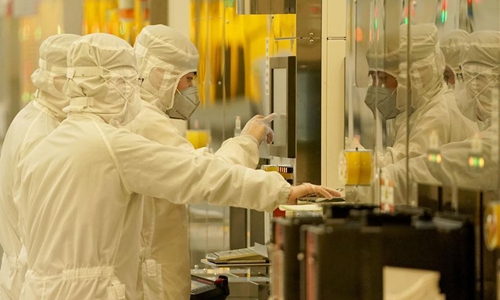US efforts to contain China's rising high-tech sector weaker than expected: SMIC founder
Source: Global Times Published: 2020/8/5 12:23:41

Technicians work in a workshop of Wuhan Xinxin Semiconductor Manufacturing Co., Ltd (XMC) in Wuhan Donghu New Technological Development Zone in Wuhan, capital of central China's Hubei Province, Feb. 14, 2020. Recently, some companies in Wuhan Donghu New Technological Development Zone, also known as China Optical Valley, have resumed production amid the COVID-19 outbreak.Photo:Xinhua
The US has less power to contain China's rising high-tech sector than people expected, and China has the ability to catch up in the future, a senior industry expert said on Tuesday.
Richard Chang, founder and former CEO of China's leading contract chip maker Semiconductor Manufacturing International Corp (SMIC), said during a speech at an industry event that when the US cannot compete with other countries, it resorts to administrative means.
From blacklisting Chinese telecommunications giant Huawei to its current threat to ban Chinese app TikTok, the US government has utilized abusive administrative approaches to contain Chinese firms.
The US contained the staggering rise of Japan, which could have developed into an economic superpower, in the 1980s. "Now the US' target has shifted to China, but its ability to contain is not as strong as before," Chang said.
"But we should not lower our guard," he stressed.
China has world's leading 5G technologies, which has brought huge pressure to the US. "Its leading position in 5G means China will run ahead in communications, artificial intelligence, cloud computing and so on," Chang said.
Faced with the US' crackdown in the high-tech sector, China has been stepping up efforts in recent years to increase its competence in the semiconductor industry.
"China is very strong in packaging and testing. As far as equipment is concerned, we are lagging behind in optical technology. If we look specifically at the materials, manufacturing and design of three generations of semiconductors, I don't think the gap we have in materials is very big," said Chang.
He also pointed out a weakness in China's development of its semiconductor industry: a lacking talent pool.
"Israel has many good firms that we can consider because of their talent. We do not need many people - a few qualified individuals could come and teach our young people, then we could advance at an equal pace," he noted.
Posted in: INDUSTRIES,COMPANIES,BIZ FOCUS